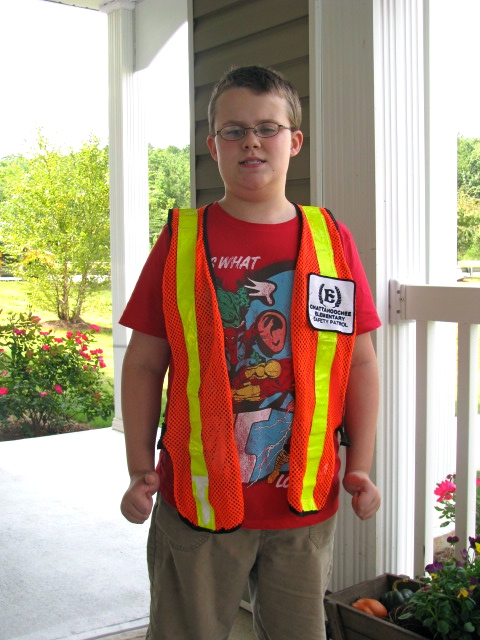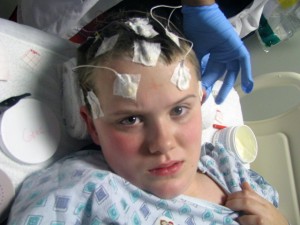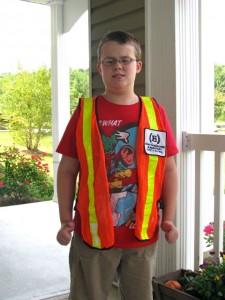The Making of a Member
Posted on October 7, 2013

Before we begin ministering “to” PURE people, it is beneficial to conceptualize ministering “with” them. Ministry “to” denotes an act of charity or sympathy but ministry “with” is about making them full members of the Body. As long as we continue ministry as an act “to” the PURE in our community, there is an empty space between us that prevents full membership, and belonging. This article a story about how we might make a member out of a stranger.
Stanley Hauerwas writes, “…our projection of their suffering, need not create an unbridgeable gap between them and us. We learn that they are not incapable of fellow feeling with us and, just as important, that we are not incapable of fellow feeling with them.”[1] Here is one story of the making of a member.
Looking back from the end of this school year, I can say it has been our toughest ever. Noah’s schedule went something like this:
- August: mom in hospital with kidney stones; start NEW school 3 days late
- September: car accident with dad
- October: strep throat (3 times) & mono
- November: recovery from mono
- December: onset of atypical migraine headaches which present with stroke-like symptoms; 8 days in hospital
- January: realize that I am 4 months behind in my best subjects and 3 years behind in reading
- February: be told that I will most likely repeat 5th grade…again
I’d say that I don’t know how Noah survived the school year because lets not forget that he did all of this with autism.  But something happened early on during the year that set our course on a different trajectory. Seeing it now from the not so distant future, I think I can draw some conclusions about how one small thing made all the difference.
But something happened early on during the year that set our course on a different trajectory. Seeing it now from the not so distant future, I think I can draw some conclusions about how one small thing made all the difference.
Noise is still Noah’s largest area of sensitivity. He can compensate for sudden noise or even crowd related noise now. But at the end of a taxing day, prolonged noise is very difficult. So I wasn’t surprised to get a call from the principal at Noah school just a few short weeks into school.
Noah had already commented on having difficulty remembering and hearing his car rider number. He had asked for me to make a special tag to attach to his backpack to help him focus on the number in the crowded cafeteria where 200 plus kids gathered for car line every afternoon. I knew he was having difficulty so I was ready for the call.
She began, “Well, Noah is having some difficulty with the car rider area each afternoon. It is quite loud. He is becoming increasingly anxious. We just don’t think it is going to be possible for him to continue in the cafeteria.” There were several possible solutions to this scenario. I was prepared for each one.
She could have said: We think it would be best for you to pick Noah up early. While I wasn’t opposed to this, I did wonder how it might affect Noah’s ability to build up a threshold for noise. If he is never exposed to noise, he will never learn to use strategies to compensate.
She could have said: We think it would serve Noah best if we kept him in a quiet room separated from the other car riders. While this would definitely lessen Noah’s anxiety, I was concerned about isolating him from peers. I was afraid this would further draw him apart from any possible peer group.
She could have said: We believe it to be in Noah’s best interest if you put him on the Special Education Bus Route. This, again, is a viable solution. But Noah wasn’t ready to ride the bus. And the other children at our apartment complex already laugh at him just coming and going from the car. He won’t even go to the playground unaccompanied. I didn’t want to give them one other thing to laugh at him about.
What I didn’t expect is that she said none of these things. Instead, her solution was something much more than I could have anticipated.
She said, “What we are wondering is if we could make Noah a member of Safety Patrol? Putting him in a leadership role would be good for his self-esteem. We think that teaching him to say ‘Good afternoon” to children he does not know would be good for him socially. His speech therapist is willing to work with us on teaching him to say the phrases he would need to utilize. It would give him an instant peer group. We believe making Noah a leader would be good for all of us.”
To say I was speechless is an understatement.
 And so Noah began his first leadership role. And, as anticipated, he really took to it. One afternoon, just as the buses had been loaded, the storm sirens exploded with news of an imminent tornado. Noah quickly asked a teacher how he could “help.” She confessed to me later that she didn’t even think, “Wait. This is Noah. Lets be sensitive to his autism.” Instead she just handed him a sign with an arrow on it and instructed him to tell children being evacuated down a hallway where to sit. With no panic and in clear diction, Noah managed the evacuees with ease.
And so Noah began his first leadership role. And, as anticipated, he really took to it. One afternoon, just as the buses had been loaded, the storm sirens exploded with news of an imminent tornado. Noah quickly asked a teacher how he could “help.” She confessed to me later that she didn’t even think, “Wait. This is Noah. Lets be sensitive to his autism.” Instead she just handed him a sign with an arrow on it and instructed him to tell children being evacuated down a hallway where to sit. With no panic and in clear diction, Noah managed the evacuees with ease.
Last week Noah graduated from 5th grade. At the beginning of the ceremony, Noah and a friend (also autistic) led the school in the pledge. Shortly after this school leadership teams were acknowledged and Noah stood to receive honor as a member of the Safety Patrol.
Allow me to be candid and logical for a moment. There is no outward reason Noah should have been a member of the Safety Patrol. Safety Patrol was invented to keep kids like Noah from getting themselves lost or in trouble. Who puts a barely intelligible, autistic child with very low verbal ability in an instructive role? Well, someone who believed he was already a member despite his inability to achieve success the way we typically measure it.
Wendell Berry has written, “A community is the mental and spiritual condition of knowing that the place is shared, and that the people who share the place define and limit the possibilities of each other’s lives. It is the knowledge that people have of each other, their concern for each other, their trust in each other, the freedom with which they come and go among themselves.”
Noah’s school made it possible for him to
be an instant member of the community – despite his disabilities – by sharing that place with him. In essence, they created a place for him to be. And in sharing that created space, they did not place a limit on the possibilities of his life. And he thrived there.
Very often I am asked how it is possible to include the disabled in our church programming. I share this example of a school that did more than include. They created a space that made Noah a contributing member in a way that did not define and limit him. This act required no extra government funding or a one-to-one aid people are so fond of reminding me that churches do not have access to. It just required that a space be made.
The creating of that space made all the difference. It made him a member.
[1] Stanley Hauerwas, The Hauerwas Reader, ed. John Berkman and Michael Cartwright (Durham, NC: Duke University Press Books, 2001), 573.

October 12, 2013 at 1:45 pm
Love this! Congratulations Noah!